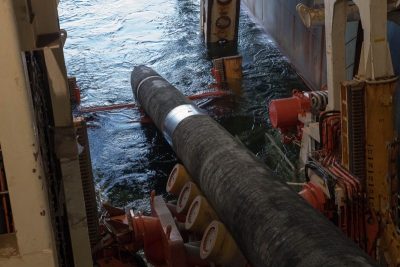The leaders of both Norway and Germany want NATO to set up a special center for surveillance of underwater pipelines along with other critical infrastructure. The goal is to strengthen security at a time of high tensions between Europe and Russia.

Norwegian Prime Minister Jonas Gahr Støre and German Chancellor Olaf Scholz met in Berlin this week and agreed to propose establishment of a subsea security center to be run by NATO. The two then met with NATO Secretary General Jens Stoltenberg, who said he welcomed the German-Norwegian initiative to coordinate the protection of subsea infrastructure.
“Such a center would provide allies with better situational awareness, map our vulnerabilities and help deter and recover from any distruptive actions against allied undersea infrastructure,” said Stoltenberg, who, like Støre and Scholz, was attending the Berlin Security Conference along with other European leaders.
Støre noted how the thousands of kilometers of oil and gas pipelines along with fibre optic cables and other powerlines running under the North- and Baltic seas “are critical to our mutual security and economy. We must therefore do more to protect this infrastructure.”
Alarms rang last summer when a Russian pipeline that used to send gas to Northern Europe exploded in what’s widely believed to be a result of sabotage. The powerful blasts that severely damaged the Nord Stream pipeline posed a clear threat to the Norwegian pipelines on which Europe now relies for gas supplies. Europe had already cut off most gas supplies from Russia in retaliation for Russia’s invasion of Ukraine and ensuing war.
“Norway feels a special responsibility to secure the supply of gas to Europe,” Støre said, especially as winter sets in. He noted that Norway and several of its NATO allies have already boosted patrols of offshore oil and gas installations, most recently with the help of several British Navy vessels that also visited Oslo.

“We still see a need to share more information between nations and companies, and to bring civilian and military capacity closer,” Støre said. That’s why he and Scholz took what Støre called “an informal initiative” to strengthen protection of subsea infrastruction. The NATO center would follow up on efforts already in place.
Støre, Scholz and Stoltenberg agreed that such a center should also operate in cooperation with the private sector, so that oil companies and defense forces can better organize plans and security measures to hinder sabotage.
Stoltenberg was predictably receptive, while also praising the allies’ support for Ukraine. Military equipment provided by Germany, Norway and many other NATO allies, Stoltenberg noted, helps protect Ukrainian homes, school and hospitals from the torrent of missiles Russia has been firing at civilian infrastructure in Ukraine after being forced to retreat from eastern regions of the country.
Helping NATO neighbours, too
“If Putin wins, that would embolden authoritarian leaders to use force again to achieve their goals,” Stoltenberg said during another meeting with Scholz in Berlin. “That would make the world more dangerous and all of us more vulnerable.”
The NATO leader who’s a former Norwegian prime minister also promised help to countries under pressure from Russia, including Georgia, Moldova and Bosnia-Hercegovina. He said NATO allies would take steps “to help them protect their independence and strengthen their ability to protect themselves.”
NATO also hosted a meeting of allied foreign ministers in Bucharest earlier in the week, with the intent of sending a signal about how important it is to create stability not just for NATO countries but also those outside NATO.
NewsinEnglish.no/Nina Berglund

